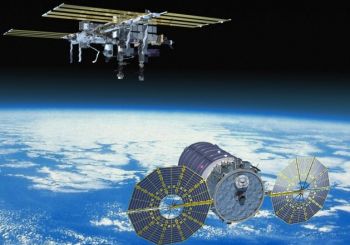Orbital Sciences Schedules Antares Engine Testing
By Space Coast Daily // April 1, 2013
Private Firm Aims To Begin ISS Cargo Deliveries
BREVARD COUNTY • KENNEDY SPACE CENTER, FLORIDA – If all goes according to plans, private space company Orbital Sciences Corporation will join SpaceX as one of two firms with a NASA contract for transporting cargo to the International Space Station sometime this year.

After a technical delay of several months, Orbital Sciences announced this past weekend that it will test the engines of its new Antares rocket this month.
The test will be conducted at the Mid-Atlantic Regional Spaceport’s pad-0A at NASA Wallops Flight Facility in Virginia between April 16 to 18.
The hot-fire test will fire the Antares’ dual AJ26 rocket engines, generating a combined total thrust of 680,000 lbs., for about 30 seconds while the first stage of the test rocket will be held down on the pad.
The hot fire will demonstrate the readiness of the rocket’s first stage and launch pad fueling systems to support upcoming flights.
If successful, the next step for Orbital Sciences will be a test flight of Antares carrying its new unmanned robotic Cygnus spacecraft.
That launch could take a confirmation test flight to the ISS.
Developed under the joint NASA/Orbital Commercial Orbital Transportation Services (COTS) program, Orbital Sciences created Cygnus and the Antares rocket program to provide low-cost, reliable access to space for medium-class payloads.
In addition to the company’s COTS development and demonstration program, Orbital Sciences was selected by NASA to begin ISS resupply flights under the Commercial Resupply Service (CRS) contract.
The contract calls for eight Cygnus missions between 2013 and 2015 hauling tons of cargo to the ISS and ferrying ISS waste back to Earth.
The two-stage Orbital Science Antares rockets employ two Aerojet AJ26-62 engines each with independent thrust vectoring and are fueled by liquid oxygen and kerosene.

The Cygnus spacecraft is made up of a service module and a modular pressurized cargo module.
The cargo module is designed to accommodate and transport reasonable sizes of crew supplies, spare parts and scientific experiments.
Upon launch into a low-Earth orbit, Cygnus will demonstrate its maneuvering capability and attach to the ISS using the space station’s robotic arm.
Once the cargo has been removed by astronauts aboard the ISS, the Cygnus spacecraft will detach and return to Earth over the Pacific Ocean.
Cygnus mission operations will be managed from Orbital Sciences’ mission control complex in Dulles, Va. in conjunction with NASA’s Johnson Space Center in Houston.
Orbital Sciences says its Antares rockets can be launched from a variety of sites including Cape Canaveral Air Force Station, the Wallops Flight Facility in Virginia, the Western Range at Vandenberg Air Force Base in California and the Kodiak Launch Complex in Alaska.
SpaceX completed its first test flight and first actual cargo delivery to the ISS in 2012 and another mission is currently docked at the station.












